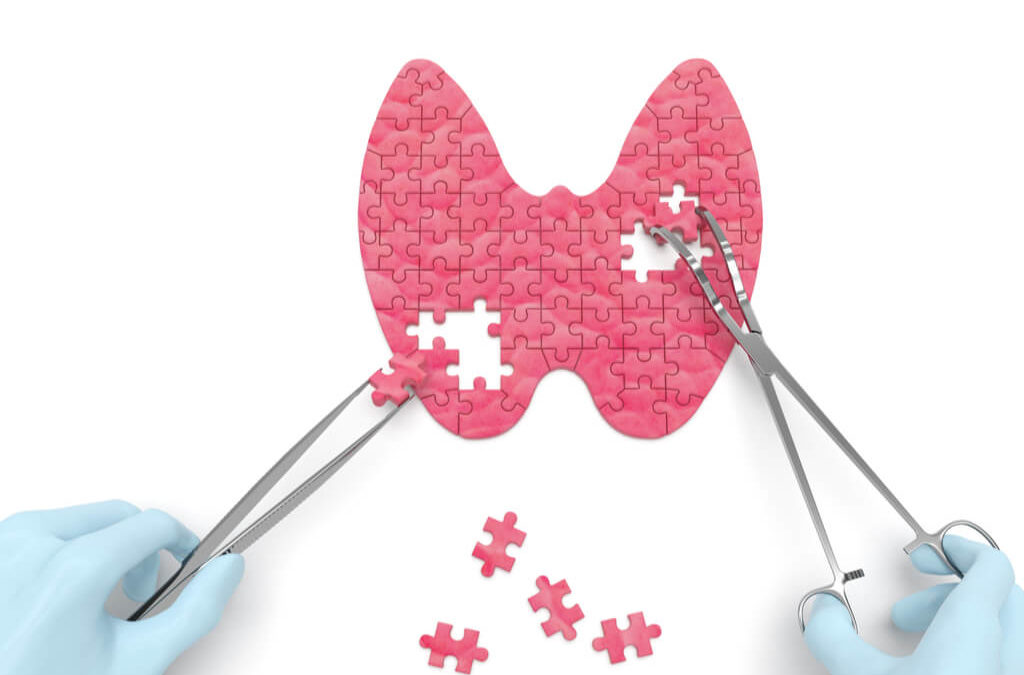Traditional thyroid and parathyroid surgery are used to treat problems such as goiters, recurring thyroid cysts, thyroid cancer and symptomatic thyroid nodules. Usually, thyroid surgery in Nashville involves either inspecting or removing the diseased thyroid or parathyroid glands. According to a report and a conservative estimate from 2017 in Physician’s Weekly, 150,000 thyroidectomies are performed every year. However, a new scarless approach to thyroid surgery has emerged, known as the transoral endoscopic thyroidectomy vestibular approach (TOETVA). A scarless thyroidectomy, or TOETVA, provides patients more options when facing thyroid surgery, and the benefits of no scarring left behind.
What Does Traditional Thyroid Surgery Consist Of?
Traditional thyroid surgery is performed by making an external horizontal incision on the neck. The next step involves additional incisions to allow the surgeon to peel back the subcutaneous tissue and access the thyroid or parathyroid gland. Yet, in most cases of a traditional thyroid surgery, patients may notice a visible scar on their neck after healing of the incision site.
Will I Have a Scar After Thyroid Surgery?
Usually, the first incision is made in line with the natural skin fold lines of the patient. This is done in order to minimize scarring. However, depending on the patient’s skin tone and quality, they may still see a scar on the neck over time.
What Is Scarless Thyroid Surgery in Nashville?
Scarless parathyroid, and thyroid surgery is a recent medical development. Medically referred to as scarless thyroidectomy or TOETVA, this procedure uses a transoral approach to access the thyroid gland during operation. The goal of this procedure is the same as regular thyroid surgery, but no scar will be visible after recovery.
How TOETVA or Scarless Thyroid Surgery is Performed
This new method is performed by making small incisions in the mouth and then using surgical tubes to gain access to the thyroid gland. Or the parathyroid gland if it is being removed. Alternatively, this procedure may be performed endoscopically, meaning as an exploratory procedure to inspect the thyroid and parathyroid glands before removing tissue.
Once the surgeon has access to the glands and nodules, they can make precise cuts and sever the tissue that needs to be removed. Because scarless thyroid surgery has a limited amount of space to work with, complete thyroidectomy may not be right for some patients. If you are experiencing a thyroid-related condition, talk to your doctor or surgeon about no neck scar endoscopic thyroid surgery and if it’s right for you.
Why is Transoral Thyroid Surgery, or TOETVA, Considered a Specialty?
Because scarless thyroidectomies are still relatively new, only certain trained surgeons offer to perform it. At The Surgical Clinic–Rutherford, Dr. Joshua Taylor offers transoral thyroidectomy and parathyroid surgery. He is happy to discuss any questions or concerns with you. Also, he will be happy to help you identify if this surgery is right for you. Getting thyroid surgery in Nashville is an easy process with great surgeons like Dr. Joshua Taylor.
What are the Advantages and Benefits of TOETVA or Scarless Thyroid Removal Surgery?
The main benefit of scarless thyroidectomy is right there in its name–no external scarring. However, because there are still incisions being made, there will still be visible scars on the inside of the mouth. But in that case, you have no need to worry about hiding a scar on your neck.
Additional benefits that come from undergoing a scarless thyroid of TOETVA surgery or a traditional thyroid surgery include:
- Decrease pain and discomfort
- Quicker recovery time
- Decrease trauma to the surrounding muscles, nerves, and blood vessels on the neck
What to Expect with Scarless Thyroid Surgery
After reviewing your medical records with your doctor, you will be referred to a surgeon that specializes in thyroid and parathyroid surgery. The specific tests you will need to have performed will depend on your symptoms and health.
Should you decide to undergo a scarless thyroidectomy, you will first need to set up a consultation with your surgeon. During your consultation, your surgeon will review the steps of the procedure, answer any questions you have and explain what steps you need to take during your recovery.
The week before your operation you should stop taking any non-steroid anti-inflammatory medications as well as aspirin. Your doctor will instruct you if you should stop taking any other medications that may interfere with the anesthesia.
On the day of your operation, you should have a friend or family member drive you to the appointment in the Nashville area. The surgery usually lasts anywhere between one to three hours depending on the patient.
After the surgery, you will be required to stay overnight in the hospital where your recovery will be monitored.
What to Expect During Scarless Thyroid Surgery Recovery

After your surgery, you will need to stay on a liquid diet for the first few days before eating soft foods. After about three days, you should be able to eat and drink normally.
You can expect some mild swelling and soreness in your throat the day after surgery and for a few days after. Most patients only need a prescription pain reliever for the first three days after their operation. Afterward, most patients can manage their symptoms with over-the-counter anti-inflammatories.
You will also be given a compression neck support to wear that will help reduce swelling and support the healing process. Make sure you maintain your oral health in order to prevent the incisions from getting infected. You may also notice some bruising around your face and neck, but these should fade after a week or two.
Who is an Ideal Candidate for Scarless Thyroid Surgery?
A scarless thyroidectomy is not right for everyone. We are selective of which patients undergo this minimally invasive procedure in order to provide the best results. Most candidates should be in good health and at a reasonable weight in order to allow trans oral access to the thyroid or parathyroid glands.
Factors which influence the suitability for TOETVA include:
- Size of Nodules
- Type of Nodules
- Previous and Current Medical History
Conditions treatable by no scar thyroidectomy include:
- Small thyroid nodules
- Grave’s Disease
- Goiters
- Primary hyperthyroidism
Other cases of thyroid disease may be evaluated by your doctor and surgeon. In terms of thyroid cancer surgery, the transoral endoscopic thyroidectomy may only be performed in cases where the cancer nodules are less than 2 centimeters in diameter.
Some cases may still require traditional open surgery, particularly for larger or more complex thyroid conditions. Your healthcare provider will assess these factors to determine if TOETVA is the best option for you.
Risks of Thyroid Surgery
The most common after thyroid surgery side effects are the pain, swelling and bruising around the neck and face. However, there are always additional risks to surgery that may include damage to your vocal chords, bleeding and infection. If you notice any of these side effects, tell your doctor immediately in order to monitor your health.
Will Thyroid Surgery Damage My Vocal Cords?
There is a small risk that the nerves connected to the vocal cords may be damaged during the operation. However, most cases of postoperative hoarse voice will heal within a few weeks. In extreme cases, the hoarse voice may last for up to six months. In extremely rare cases, patients experienced permanent hoarse voice, but this can be corrected through additional treatments.
Scarless Thyroid Surgery at TSC Rutherford
Our providers at TSC Rutherford are proud to offer this innovative surgery to our thyroid patients across Middle Tennessee. If you are interested in experiencing the benefits of no scar thyroid surgery, call The Surgical Clinic–Rutherford to schedule a consultation today.

